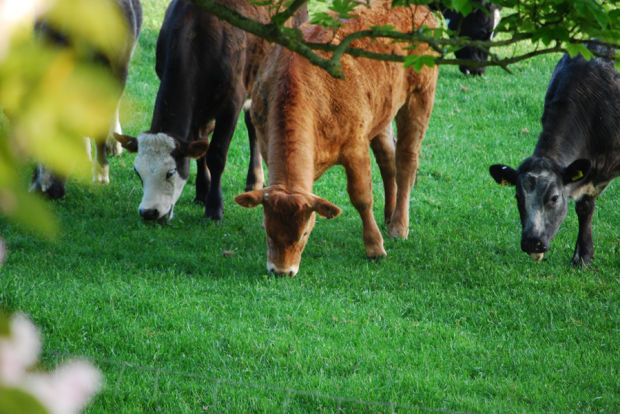LIHUE — Officials from Hawaii Dairy Farms plan to gradually phase in operations for a dairy farm on 578 acres of land in Mahaulepu in response to community feedback received over the past several months. Those plans, outlined in a modified application
LIHUE — Officials from Hawaii Dairy Farms plan to gradually phase in operations for a dairy farm on 578 acres of land in Mahaulepu in response to community feedback received over the past several months.
Those plans, outlined in a modified application to the state Department of Health, call for the introduction of 650 to 699 cows to allow “the pasture system to fully establish,” Hawaii Dairy Farm officials wrote in a statement.
“We want the community to know that we’ve heard its concerns and we’re planning a dairy that goes beyond compliance to ensure the operation is environmentally protective, adaptable to operating conditions and allows for future growth,” said Kyle Datta, general partner of Honolulu-based impact investment firm Ulupono Initiative, which provides the funding for Hawaii Dairy Farms.
The size of the herd in this first phase, they added, equates to roughly 1.5 cows per acre and “is comparable to former cow-calf and sheep grazing operations within Mahaulepu valley.”
The plan submitted to the Department of Health also includes facilities that can accommodate up to 2,000 milking cows — an amount that’s closer to the 1,800 cows originally proposed by dairy farm officials several months ago.
“It has always been our intention to ramp up the farm operations to the full size over time, as you would with any business,” HDF spokeswoman Amy Hennessey said. “By dividing the operational plans into two phases, we are providing the community the opportunity, during phase one, to better understand the model as we demonstrate it will work in the valley. Once proven, we can move forward with our application for phase two for the full-sized dairy.”
Current plans also call for the construction of effluent ponds that have an additional 100 days of storage capacity beyond regulatory requirements; the implementation of consistent aeration schedules to control effluent pond odors; and 50-foot setbacks to address runoff mitigation.
“Our commitment is to develop a sustainable farming operation in cooperation with the regulators to produce fresh, local milk for families across the state at prices everyone can afford,” Datta said. “This dairy strengthens the ability of the agricultural sector to continue to provide meaningful jobs and valuable economic support for Kauai.”
Kauai Mayor Bernard Carvalho Jr. said he was pleased to see that Hawaii Dairy Farms is demonstrating a good faith effort to work with the community and address the valid concerns that have been raised.
“It is my hope that we can come together as one ohana to not just talk about sustainability, but to find a way to make it happen,” he wrote. “This is an incredible opportunity for Kauai to become a leader in food self-sufficiency for the entire state.”
But not everyone is on board, even with the new changes.
“I support fully dairies on Kauai,” Sacramento, California resident Ronald John and Koloa resident Bridget Hammerquist jointly wrote in an email. “In my professional life, I have spent a great deal of time evaluating proposals. This is the most flawed proposal of any nature I have ever seen.”
Hammerquist and John said they would like to see the proposed herd reduced in half and moved to “an area more suited and certain of success than this one.”
“I would support fully a dairy that is properly located and sized, not one so closely located to a pristine coastline and environmental haven,” John and Hammerquist wrote. “This HDF concept meets none of those two conditions.”
The dairy farm plan is also being challenged in state court by Kawaiola Development, LLP, which owns the Grand Hyatt Kauai Resort and Spa and the Poipu Bay Golf Course.
In their attempt to stop the dairy’s development, Kawaiola Development, LLP attorneys have claimed that the hotel and golf course’s “business, recreational, environmental and aesthetic interests” would be “directly and indirectly adversely affected by the wastewater treatment unit and the dairy farm.”
The lawsuit, according to court documents, is also seeking to have Hawaii Dairy Farms officials prepare an environmental assessment to address these issues.
Datta, in a statement, criticized the lawsuit, claiming that it “will impact all animal agriculture within the state.”
“Nearly all of the locally owned and operated, family-run animal operations that have fed the people of Hawaii for generations are considered animal feeding operations and could be put out of business,” Datta wrote. “Further, the misguided legal concept that the owners of reclassified agricultural land can sue to have their agricultural neighbors declared a nuisance would impact every single farmer in the state, large or small, and is a direct assault on the rights of farmers under the laws of the state of Hawaii.”
Emails and phone calls to Kawaiola Development, LLP attorneys and Grand Hyatt Kauai Resort and Spa officials were not returned before press time.


